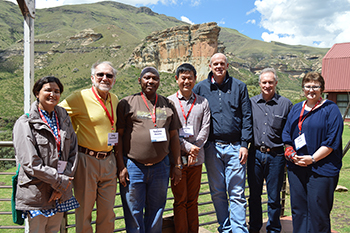Latest News Archive
Please select Category, Year, and then Month to display items
18 November 2024
|
Story Jacques Maritz
|
Photo Supplied
 Muhammad Cassim, a second-year student in the Department of Engineering Sciences in the Faculty of Natural and Agricultural Sciences.
Muhammad Cassim, a second-year student in the Department of Engineering Sciences in the Faculty of Natural and Agricultural Sciences.
Muhammad Cassim, a second-year student in the Department of Engineering Sciences in the Faculty of Natural and Agricultural Sciences at the University of the Free State, will participate in the winter university project in Pskov, Russia, from 25 November to 9 December 2024.
The winter school aims to strengthen relationships among young engineers and deepen international interaction via skills improvement, joint projects, and social cohesion. The programme boasts a densely packed education block, project block, and cultural block.
Cassim is part of the UFS Grid Related Research Group and actively participates in research centred on complexity science. He intends to complete his BSc Physics degree with Engineering subjects and progress towards postgraduate studies in the UFS Department of Physics.
He is currently working on verifying experimental developments in the field of synchronisation in complex networks. While he has already completed this high-performance computing training in his first year under the leadership of Albert van Eck (Director, UFS E-research), he is looking forward to the masterclasses in holographic modelling, deep learning, direct laser deposition, and database. Closely resembling his current research, he will have the opportunity to gain more experience in the use of set theory and graph theory in solving digital information processing problems.
For more information about international scholarships for study abroad opportunities, contact Mbali Moiketsi in the Office for International Affairs.
Cassim’s student profile is the culmination of the department’s strategy to produce young applied scientists who are subjected to the culture of research during their undergraduate study and could articulate with ease to other departments for postgraduate studies. The department aims to align with the UFS’ Vision 130 by producing competitive students who can operate in the postgraduate paradigm with the digital themes of veterinary science and ecological engineering science.
Young researchers shine during Afromontane Colloquium
2016-12-01

From the left are Drs Reetu Sogani (India),
Greg Greenwood (US-Switzerland), Teboho Manchu
(Acting Campus Principal), Drs Jianchu Xu (China),
Henri Rueff (Switzerland), Glen Taylor (Senior Director:
Research Development), and Elsa Crause
(Campus Vice-Principal: Academic and Research).
The University of the Free State’s Afromontane Research Unit (ARU), which is situated on the Qwaqwa Campus, has the potential to produce some of the world’s best and dynamic young researchers. This is the view of Dr Henri Rueff, who was one of the keynote speakers during the recent ARU Colloquium hosted at Golden Gate in the Eastern Free State.
Dr Rueff, a geographer and environmental economist from the Universities of Basel and Bern in Switzerland, was referring to no less than ten Qwaqwa Campus postgraduate students who made oral and poster presentations during the inaugural international colloquium.
“You have some of the world’s most motivated and highly skilled students who have the courage to stand in front of extremely critical scientists from all over the globe – and that must be commended,” he said.
Also talking about the students at the colloquium, was Dr Reetu Sogani from India, who said that her first trip to South Africa did not disappoint. “This colloquium was a very good learning experience for me as I had the opportunity to interact with brilliant and young scientists from this part of the world,” she added. In closing the colloquium, the Senior Director: Research Development, Dr Glen Taylor, committed the UFS to the success of the unit.
“The ARU will strengthen the research output of the campus. But most critically, it is setting the research agenda for the Qwaqwa Campus, and for the institution at large, to address the challenges that the surrounding mountain communities are faced with,” he said.